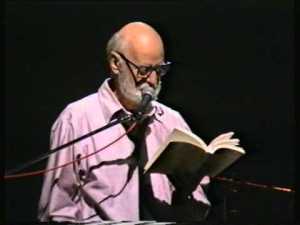Lawrence Ferlinghetti: Ezra Pound at Spoleto
The summer of 1967 has been called the “Summer of Love.” American artists from San Francisco attended Italy’s famous Spoleto Festival and introduced to Europe the “hippie” lifestyle. Young men and women went around barefoot with flowers in their hair amid an air heavy with incense and marijuana while Alan Ginsberg, Gregory Corso and Andrei Voznesensky read their non-violent dissent, anti-Vietnam war poems together at the Teatro Melisso in front of 7,000 people. Lawrence Ferlinghetti also read a poem from his book ‘To Fuck To Love Again,’ which was a celebration of ‘love of’ anarchy.
“Even fast exploding stars bizarre flickering, roving rebels even here in the scheme of some perfect utopia fast ripping through the cobweb of silver, as in the palm of your hand the perfect blueprint of the life line of the heart and the head suddenly crossed by a cataclysmic tear, not lost yet non tutte separate all the darkness still held together in some downtown property even now in the dawn, while most incendiary yet another rebel who burns intensely rubs his match on our night… ”
Recognized as one of the most important poets of the Beat movement, Ferlinghetti’s poetry is about simple and everyday things with a style of writing which seems effortless, its energy flowing like music, with colourful and romantic images that inspire all the senses. In his best work, he harkens back by the great art traditions of Europe and pays homage to Baudelaire, Picasso, Stravinsky, recalling their atmosphere and creating a place for the masters of the past in the modern world.
Ferlinghetti’s reverence for the history of art is evident when he recalled a personal highlight of the festival in his 1968 prose piece ‘Pound at Spoleto:’ I walked into the loge of the Teatro Melisso, the lovely Renaissance salle, where the poetry readings and the chamber concerts were held every day of the Spoleto Festival, and suddenly saw Ezra Pound for the first time, still as a mandarin statue in a box in a balcony at the back of the theatre, one tier up from the other stalls. It was a shock, seeing only a striking old man in a curious pose, thin and long haired, aquiline at 80, head tilted strangely to one side, lost in permanent abstraction… After three younger poets on stage, he was scheduled to read from his box, and there he sat with an old friend, who held his papers, waiting. He regarded the knuckles of his hands, moving them very little, expressionless. Only once, when everyone else in the full theatre applauded someone on stage, did he rouse himself to clap, without looking up, as if stimulated by the sound of the void… After almost an hour, his turn came. Or after a life… Everyone in the hall rose, turned and looked back up at Pound in his booth, applauding. The applause was prolonged and he tried to rise from his armchair. A microphone was partly in the way. He grasped the arms of the chair with his bony hands and tried to rise. He could not and he tried again and could not. His old friend did not try and help him. Finally she put a poem in his hand, and after at least a minute his voice came out, inaudible. A young Italian man pulled up the mic very close to his face and held it there and the voice came over, frail but stubborn, higher than I had expected, a thin, soft monotone.
“What thou lov’st well is thy true heritage. What thou lov’st well shall not be reft from thee…”
The hall had gone silent at a stroke. The voice knocked me down, so soft, so thin, so frail, so stubborn still. I put my head on my arms on the velvet sill of the box. I was surprised to see a single tear drop on my knee. The thin, indomitable voice went on.
“The ant’s a centaur in his dragon world. Pull down thy vanity, it is not man-made courage, or made order, or made grace. Pull down thy vanity, I say pull down…”
I went blind from the box, through the back door, into the empty corridor of the theatre where people sat turned to him, went down and out, into the sunlight, weeping, “Come to this, come to this…”
Up above the town
by the ancient aqueduct
the chestnut trees
were still in bloom
Mute birds
flew in the valley
far below
The sun shone
on the chestnut trees
and the leaves
turned in the sun
and turned and turned and turned
And would continue turning
His voice
went on
and on
through the leaves…


